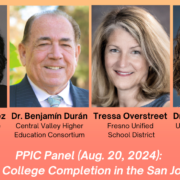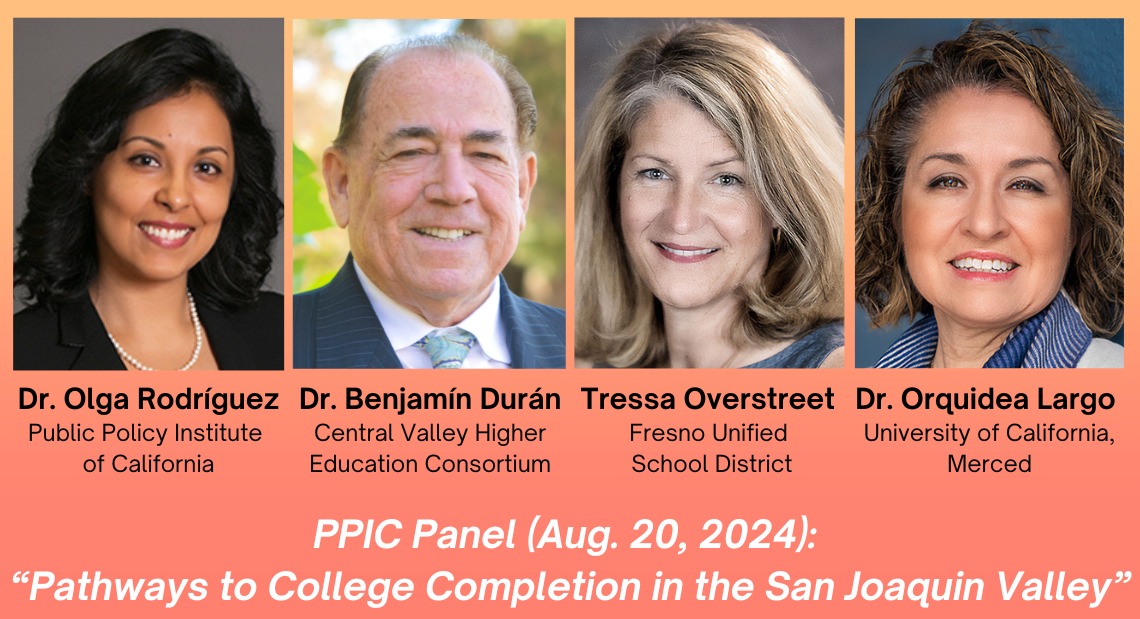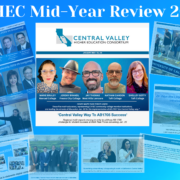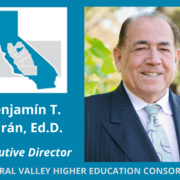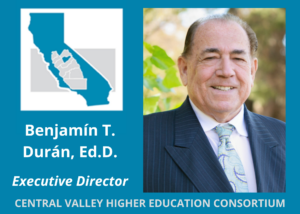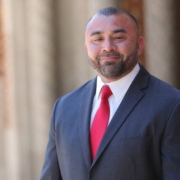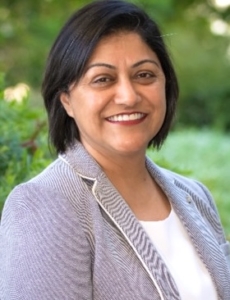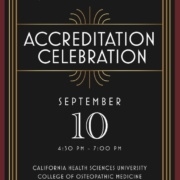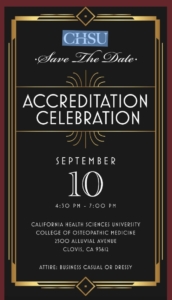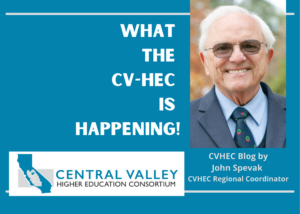 In the “What the CV-HEC is Happening” Blog for our summer 2024 special edition, Dr. John Spevak presents an observation about the value of a higher education. Dr. Spevak, who is a vice president-emeritus of Merced College and currently a regional coordinator for CVHEC, coordinates the English and Math Task Forces for the consortium — all champions for student support through such measures as dual enrollment. Through the consortium task forces, the former English teacher and college administrator continues to work closely with educators in the field for the educational advancement of students.
In the “What the CV-HEC is Happening” Blog for our summer 2024 special edition, Dr. John Spevak presents an observation about the value of a higher education. Dr. Spevak, who is a vice president-emeritus of Merced College and currently a regional coordinator for CVHEC, coordinates the English and Math Task Forces for the consortium — all champions for student support through such measures as dual enrollment. Through the consortium task forces, the former English teacher and college administrator continues to work closely with educators in the field for the educational advancement of students.
Higher ed is still a good
investment … and attainable
BY DR. JOHN SPEVAK
CVHEC Regional Coordinator
Vice President-Emeritus – Merced College
According to the results of a recent poll by Gallup and the Lumina Foundation, Americans are losing faith in the value of a college education.
Overall, according to that poll as reported by the Associated Press, only 36 percent of adults say they have a “great deal” or “quite a lot” of confidence in higher education. What’s worse, the poll shows that 32 percent of Americans have little or no confidence in a college education.
That’s both misleading and misguided.
For one thing “college” can mean different things to different people. For another, having a degree from the right college can make a big difference in a person’s opportunity and income.
By “right college,” I don’t mean a prestigious private college. A right college often means, especially in California, a two-year community college, a state university, or a small private college which provides significant financial aid.
A two-year community college degree or a certificate of completion is indeed “college.” That degree or certificate can be very valuable, especially if it’s a career-technical program that’s in demand and pays well, like nursing or welding.
A four-year degree can be even more valuable, especially in fields like communications, business, health, information technology and engineering– to name a few. Their lifetime earnings are significantly higher than those with a degree.
As the Associated Press article pointed out, “For those who forgo college, it often means lower lifetime earnings, 75 percent less compared with those who get bachelor’s degrees, according to Georgetown University’s Center on Education and the Workforce. And during an economic downturn, those without degrees are more likely to lose jobs.”
One of the reasons many Americans are doubting the worth of a college education is the debt often incurred in getting one. As one person interviewed in the AP article put it, “You graduate out of college, you’re up to eyeballs in debt, you can’t get a job, then you can’t pay it off.
What’s the point?”
It’s true that many people over the past decades have incurred a significant debt from student loans, which is exacerbated by the exorbitant interest charged for these loans. I know several people who have long ago paid off the principal of their student loans but are still paying and paying the interest.
However — and this had to be noted, known and understood — a person today can get a college degree without going into significant debt. The cost, for example, of attending a California community college these days in terms of tuition (also known as enrollment fees) is often zero.
Many California community colleges are also working at reducing the cost of books by providing what’s called “open educational resources,” essentially free online textbooks, often created by the college’s faculty members.
Attending a California public university or small private college can also be financially available to most Californians, especially if they begin with a two-year associates transfer degree and then follow a plan of courses that get them to the bachelor’s degree in no more than two additional years.
I’m tired of so many Americans of all backgrounds thinking of “college” as only prestigious private institutions that charge $150,000 or much more for a four-year tuition. Those universities often have value for those who can afford it or who receive full scholarships. But the vast majority of people can’t afford that amount and can’t afford to take out loans to pay for it.
“College” for most people should not be an expensive private institution. If it were, I would also wonder if a college education was worth it. However, “college,” in California and especially in the Central Valley, is accessible, affordable and worth it.
Instead of young people (and their parents) asking, “Can I afford college,” I wish they would ask, “What are my college options? What are the real costs, not just according to pundits on TV or social media, but according to the colleges themselves.”
College personnel, more than ever, are ready and willing to talk with prospective students of all ages and the parents of younger students about the real cost of a college education. And they are also ready and willing to show prospective students the extensive personal help they will receive to succeed in courses and earn their degree.
Often television and social media pundits who say college is not worth it are people who themselves have benefited from a college education. There’s some hypocrisy in that.
It’s true that there are many hard-working Americans without a college degree who can support themselves and their families, but the odds of most people doing this are long.
In California’s Central Valley, where the median family income is below the national average, it’s especially important to dispel the myth that college is not worth it. A two-year or four-year college degree is one of the best ways to achieve an income that will sustain families — enable them to pay rent or a mortgage, purchase a reliable car, buy clothes and put food on the table.
Central Valley colleges from Stockton to Bakersfield are working harder than ever to show students the value of a college education and to streamline the paths to a degree.
Community colleges in the valley, for example, are offering more dual enrollment courses than ever where students can earn college credits in high school, which reduces their time to a college degree.
These dual enrollment courses can be taken by most high school students, not just those students who in the past were steered into advanced placement (AP) courses. Community colleges are also working harder than ever, in collaboration with their high school partners, to provide the academic support needed to successfully complete dual enrollment courses.
In addition, many Central Valley community colleges, including Merced College, are partnering with the University of California Merced and local California State University campuses to provide user-friendly guides or “maps” to students and their parents. “Pathways Program Mapper” is a tool these colleges have developed that is available to anyone with a cell phone (no login or password required).
PPM will show a student what degree is needed to enter a particular career (for example, biology, business, engineering, etc.), what range of salaries people in those careers earn and then provide a map of courses from the first semester at a community college to the last semester at a university to attain that degree in the shortest possible time.
So, please, pundits, stop telling people that a college education isn’t worth it. Moreover, I hope readers of this column spread the word that here in the Central Valley a college education is not only worth it, but it’s attainable for anyone willing to pursue it.
John Spevak’s email is john.spevak@gmail.com.

